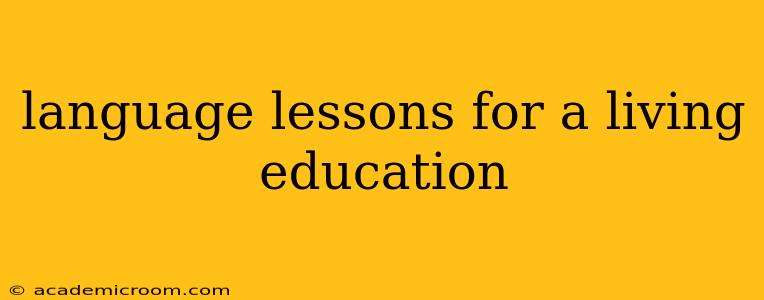Learning a language isn't just about memorizing vocabulary and grammar rules; it's about unlocking a world of cultural understanding, personal growth, and exciting opportunities. A "living education" in language goes far beyond the confines of a traditional classroom, embracing immersive experiences and real-world application. This article explores how to make language learning a vibrant and enriching part of your life.
What are the Benefits of Learning a Language?
The benefits of multilingualism are extensive and well-documented. Beyond improving cognitive function and boosting memory, learning a new language opens doors to:
- Enhanced Career Opportunities: In today's globalized world, bilingual or multilingual individuals are highly sought after in numerous fields.
- Increased Travel Experiences: The ability to communicate in the local language transforms travel from sightseeing to genuine cultural immersion.
- Improved Communication Skills: Learning a new language refines your communication skills in your native tongue as well.
- Greater Cultural Understanding: Language is intrinsically linked to culture. Mastering a language allows you to appreciate nuances and perspectives otherwise inaccessible.
- Personal Enrichment: The challenge and accomplishment of language learning are incredibly rewarding, boosting self-esteem and confidence.
How Can I Learn a Language for a Living Education?
Traditional classroom settings are valuable, but a truly "living education" incorporates diverse learning methods:
- Immersion: Spending time in a country where the target language is spoken is the most effective method. Even a short-term immersion program can significantly accelerate your progress.
- Language Exchange Partners: Connecting with native speakers online or in person provides invaluable practice and cultural insights. Websites and apps facilitate finding language exchange partners.
- Multimedia Resources: Movies, TV shows, music, and podcasts in the target language provide authentic exposure to pronunciation and natural speech patterns.
- Interactive Apps and Software: Duolingo, Babbel, and Rosetta Stone are popular options, offering structured lessons and gamified learning experiences.
- Focus on Practical Application: Don't just study grammar; use the language! Engage in conversations, write emails, and read articles in your target language.
What is the Best Way to Learn a Language Quickly?
There's no magic bullet for rapid language acquisition, but these strategies can significantly accelerate your learning:
- Consistency is Key: Regular, even short, study sessions are more effective than infrequent marathon sessions.
- Set Realistic Goals: Start with achievable targets to avoid feeling overwhelmed and maintain motivation.
- Find a Learning Style That Suits You: Experiment with different methods to discover what works best for you.
- Embrace Mistakes: Making mistakes is a natural part of the learning process. Don't be afraid to speak, even if you make errors.
- Utilize All Your Senses: Engage with the language through listening, speaking, reading, and writing.
What are Some Fun Ways to Learn a Language?
Learning should be enjoyable! Incorporate these fun activities into your language learning journey:
- Join a Language Meetup Group: Connect with other learners and native speakers in a social setting.
- Watch Movies and TV Shows with Subtitles: Gradually transition from your native language subtitles to the target language.
- Listen to Music and Podcasts: Pay attention to pronunciation and try to understand the lyrics or content.
- Read Books and Articles: Start with simpler texts and gradually increase the difficulty level.
- Cook Dishes from the Target Culture: Learn the vocabulary associated with food and cooking.
How Long Does It Take to Learn a Language Fluently?
The time required to achieve fluency varies greatly depending on factors like your native language, learning style, dedication, and the target language's complexity. While some individuals might reach a conversational level within a few months, true fluency often takes years of dedicated study and practice.
Is It Too Late to Learn a New Language?
It's never too late to learn a new language! While younger learners might have an advantage, adults possess greater cognitive skills and life experience that can aid in language acquisition. Neuroplasticity ensures that our brains remain capable of learning throughout our lives.
By embracing a holistic and engaging approach, language learning becomes a transformative journey of self-discovery and cultural exploration – a true living education. Remember to find what motivates you, stay consistent, and enjoy the process!
